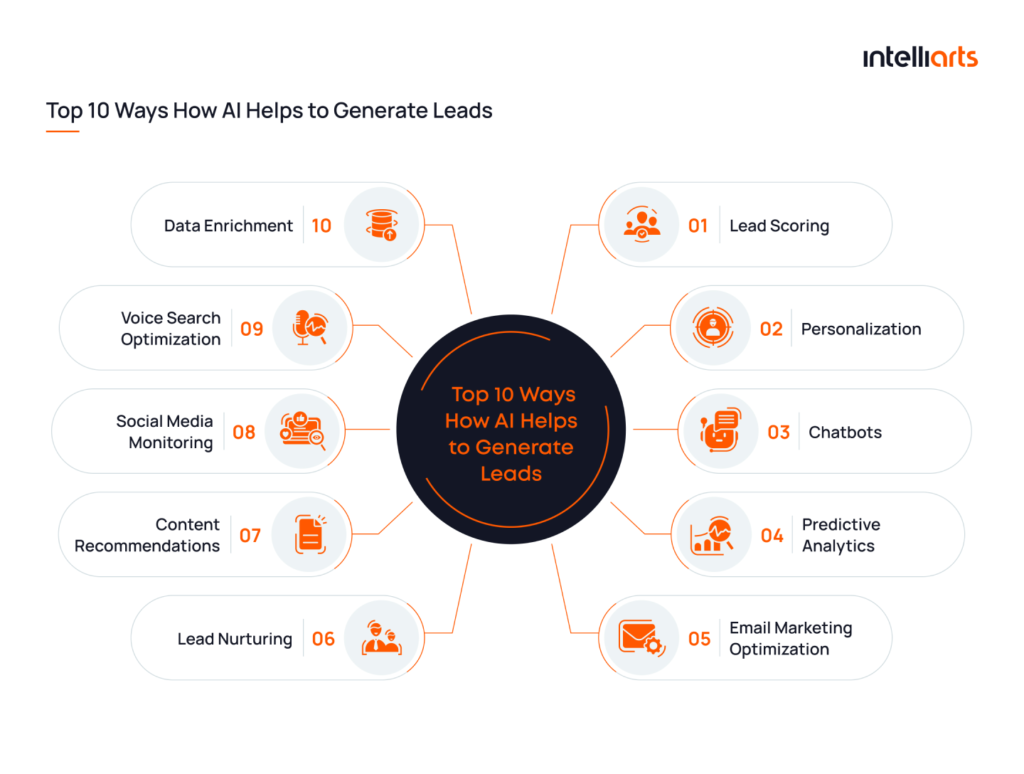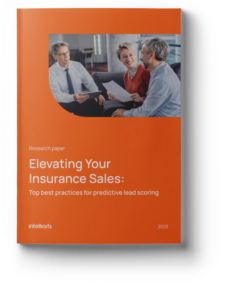Nowadays, lead generation is the number 1 of companies’ top marketing challenges. Nearly two-thirds of businesses underperform in this matter, as shown in the chart below:

Understanding the importance of solutions for lead generation, the Intelliarts team decided to write a comprehensive post delving into 10 ways how AI technology can help businesses generate leads. You will also discover value-adding reasons to implement AI in your marketing processes and familiarize yourself with real-life cases.
Top 10 ways AI helps to generate leads
The creativity in the usage of AI seems to have no limits. Classification, regression, clustering, and other algorithms offer an endless pool of opportunities to leverage AI.
You can discover more about applications of ML models in business and ML algorithms in another of our blog posts.
Now, let’s proceed with exploring 10 common ways in which different AI models can help businesses improve their AI for lead generation practices, leading to better operational outcomes:
#1 Lead scoring
Lead scoring is a technique where AI evaluates the potential of leads based on their behavior and demographic information. This process helps in prioritizing leads that are more likely to convert, ensuring that sales efforts are focused on the most promising prospects.
Applicable practices:
- Analyzing customer demographic and interaction data to score leads based on engagement level
- Using predictive analytics to forecast a lead’s likelihood of conversion
- Integrating AI with CRM systems for real-time lead scoring updates
AI-driven lead scoring effectively identifies high-quality leads, enabling businesses to allocate their resources more efficiently.

#2 Personalization
Personalization involves using AI to tailor marketing efforts to individual prospects. This method increases the relevance of marketing messages, thus enhancing the likelihood of conversion.
Applicable practices:
- Utilizing AI to segment audiences based on behaviors and preferences
- Crafting personalized email marketing campaigns
- Dynamically customizing website content for different visitor segments
Through personalization, AI provides a more targeted and individualized approach to engaging leads.
#3 Chatbots
Chatbots powered by AI can interact with potential leads in real time, providing instant responses and support. This doesn’t only improve the customer experience but also captures valuable lead information.
Applicable practices:
- Deploying chatbots on websites to engage visitors and gather lead information
- Using chatbots for initial lead qualification before human involvement
- Integrating chatbots with databases to provide personalized responses
AI chatbots are a versatile tool for both engaging prospects and streamlining the lead generation process.
#4 Predictive analytics
Predictive analytics is the usage of AI to analyze data and predict future actions of leads. It helps identify trends and patterns that can inform smarter business decisions.
Applicable practices:
- Forecasting future buying behaviors based on historical data
- Identifying market trends to target leads more effectively
- Tailoring sales strategies based on predictive insights
Predictive analytics enables businesses to stay ahead by anticipating lead behaviors and market trends.
#5 Email marketing optimization
AI in email marketing enhances the effectiveness of campaigns by optimizing various elements like timing, content, and audience targeting.
Applicable practices:
- Automating send times based on when leads are most likely to engage.
- Personalizing email content for different segments of your audience.
- Analyzing email campaign data to continually improve performance.
AI transforms email marketing into a more dynamic and responsive tool for lead engagement.
Are you looking for a trusted provider to help you implement an AI solution for generating leads for your business? Drop Intelliarts a line, and let’s discuss opportunities.
#6 Lead nurturing
Lead nurturing is about developing relationships with potential customers at every stage of the sales funnel. AI helps in creating a more personalized and effective nurturing strategy.
Applicable practices:
- Automating personalized follow-ups based on lead engagement.
- Using AI to determine the best content and timing for follow-up communications.
- Segmenting leads based on their interactions and interests for tailored nurturing.
AI aids in creating a more targeted and efficient lead nurturing process, boosting conversion rates.
#7 Content recommendations
AI can analyze a lead’s past interactions to recommend relevant content, enhancing engagement and moving leads further down the sales funnel.
Applicable practices:
- Dynamically recommending blog posts, white papers, or webinars based on lead interests.
- Using AI to curate and suggest personalized content in real-time.
- Analyzing engagement data to refine future content recommendations.
Content recommendations via AI ensure that leads receive the most relevant and engaging materials.
Discover how recommendation AI for media can boost customer retention from the video below:
#8 Social Media Monitoring
AI tools can monitor social media channels to gather insights about market trends, competitor strategies, and potential leads.
Applicable practices:
- Tracking brand mentions and customer sentiment across social platforms.
- Identifying potential leads through social listening.
- Analyzing competitors’ social strategies to find gaps and opportunities.
Social media monitoring provides a wealth of information for strategic lead generation using AI and brand positioning.
#9 Voice Search Optimization
With the rise of voice assistants, optimizing for voice search is crucial. AI helps businesses adapt their content for voice queries to capture this growing market.
Applicable practices:
- Using AI to understand and incorporate natural language in content.
- Optimizing for conversational keywords and phrases.
- Analyzing voice search trends to align content strategy.
Voice search optimization is essential in an AI-driven era, enabling businesses to stay relevant in changing search landscapes.
#10 Data Enrichment
Data enrichment involves augmenting lead data with additional insights. AI processes vast amounts of data to provide a more comprehensive view of leads.
Applicable practices:
- Integrating external data sources to enhance lead profiles.
- Using AI to analyze and interpret complex data sets.
- Continually updating lead information for accuracy and relevance.
Data enrichment through AI offers a more complete and nuanced understanding of leads, driving more effective targeting and engagement strategies.
According to a Verta, Inc. survey, 63% of companies planned to maintain or increase their AI and machine learning spending in 2023. Take a look at the list of industries businesses in which should consider investing in AI for lead generation in the first place:
Why use AI for lead generation process: Real-life cases
In the modern day, AI finds broad usage in a vast number of industries and business models. Some of the well-established companies utilize AI capabilities, particularly AI for lead generation. Let’s review their use cases to learn more about the actual business experience with this AI application:
Increased efficiency: Use case of LinkedIn’s AI-powered Sales Navigator tool
LinkedIn, a leading professional networking platform, aims to leverage AI to make the process of finding and managing sales leads more efficient. Their intent is to help sales professionals save time and effort in identifying potential leads.
Use case details:
LinkedIn’s Sales Navigator uses AI algorithms to analyze user interactions and behaviors, recommending the most relevant prospects based on these insights. This tool streamlines the process of lead generation and prioritization.
Results achieved:
LinkedIn reports a 15% increase in pipeline growth and a 17% increase in win-rate for leads sourced through Sales Navigator, with a notable 30% reduction in time spent on prospecting.
If you’re interested in achieving similar results, book a consultation with the trusted AI experts from Intelliarts.
Improved lead quality: Use case of Marketo’s AI-enhanced marketing automation
Marketo, a marketing automation software provider, focuses on enhancing lead quality for marketers and sales teams. Their goal is to leverage AI to better score and qualify leads, ensuring higher conversion potential.
Use case details:
Marketo uses AI to analyze engagement and behavioral data, which aids in more accurately scoring leads. This approach ensures that the leads passed on to sales teams are of higher quality and more likely to convert.
Result achieved:
Customers using Marketo have observed a 10% to 20% increase in conversion rates, with a 50% increase in sales-ready leads and a 33% rise in sales efficiency due to improved lead scoring.
In case you are searching for an AI and ML service tech partner, reach out to ML expert engineers from Intelliarts and let us contribute to your best project.
Better targeting: Use case of Spotify’s AI-driven music recommendations
Spotify aims to provide a highly personalized user experience. By leveraging AI and machine learning algorithms, Spotify intends to analyze user listening habits to recommend songs, thereby increasing user engagement and subscription rates.
Use case details:
Spotify uses AI algorithms to analyze vast amounts of data, including user listening history, search queries, and playlist content. This AI-driven approach enables Spotify to tailor music recommendations to individual users’ tastes, thereby enhancing the user experience and engagement.
Results achieved:
Spotify’s AI-driven personalization has resulted in significant user engagement. According to Spotify Advertising, “Discover Weekly” users stream more than twice as long as non-Discover Weekly users. Moreover, between July 2015 and June 2020, Spotify users streamed over 2.3 billion hours of their personalized Discover Weekly playlists, showcasing the feature’s popularity and impact on user experience
You can discover more about Spotify’s AI-driven recommendation system from the video below:
Increased order size: Use case of Intelliarts Predictive Lead Scoring Model
The Intelliarts team was requested by our customer, focusing on AI-driven marketing and sales efficiency, to optimize lead scoring using AI for lead generation. The intended approach should help to prioritize leads effectively, leading to cost-effective marketing strategies.
Use case details:
Intelliarts developed a custom lead score tool for our customer from insurance. The end predictive lead scoring model in machine learning can forecast the probability of how likely the lead would buy a policy. This comprehensive scoring helps in targeting leads that are more likely to convert.
Results achieved:
The machine learning-based scoring model by Intelliarts shows accuracy over 90%. After a few months after the implementation of the solution, the scoring prediction model cut off about 6% of leads, allowing the insurer to raise its profit by 1.5%. In the most successful months, the customer saw a 2.5% rise in profit.
Final Take
As of 2024, nearly two-thirds of businesses experience underperformance in the matter of lead generation. AI provides unique opportunities to boost the acquisition of leads and increase the revenue they bring to a company. From lead scoring and lead nurturing to personalization and recommendations, AI can offer it all and more.
In case you need a trusted tech partner to help develop and implement an AI-based lead generation solution, don’t hesitate to contact engineers from Intelliarts. You can see our clients for additional insight into our expertise. Intelliarts specialists are ready, willing, and able to contribute to your best project and help your business boost lead-generation processes.
FAQ
AI in lead generation automates and improves the process of identifying potential customers. It uses machine learning algorithms to analyze data, predict user behavior, and identify high-quality leads more efficiently than traditional methods.
Yes, AI seamlessly integrates with CRM systems, enhancing them with capabilities like predictive analytics, automated data entry, and intelligent lead prioritization.
AI ensures lead quality by employing advanced algorithms to sift through leads, identifying those with the highest potential based on their engagement levels, buying history, and profile completeness.











